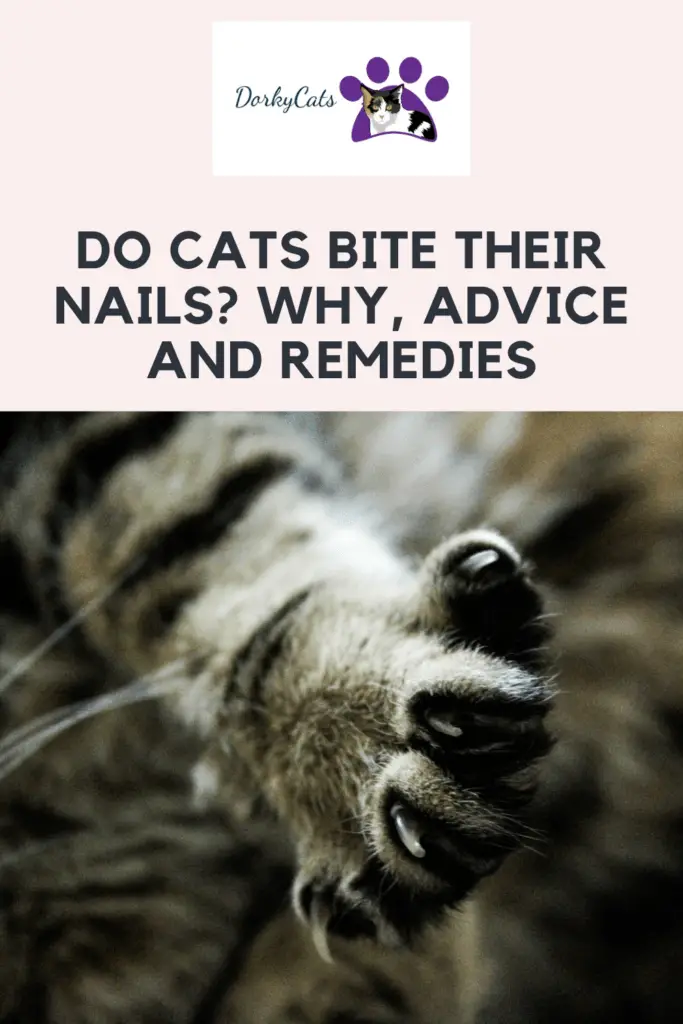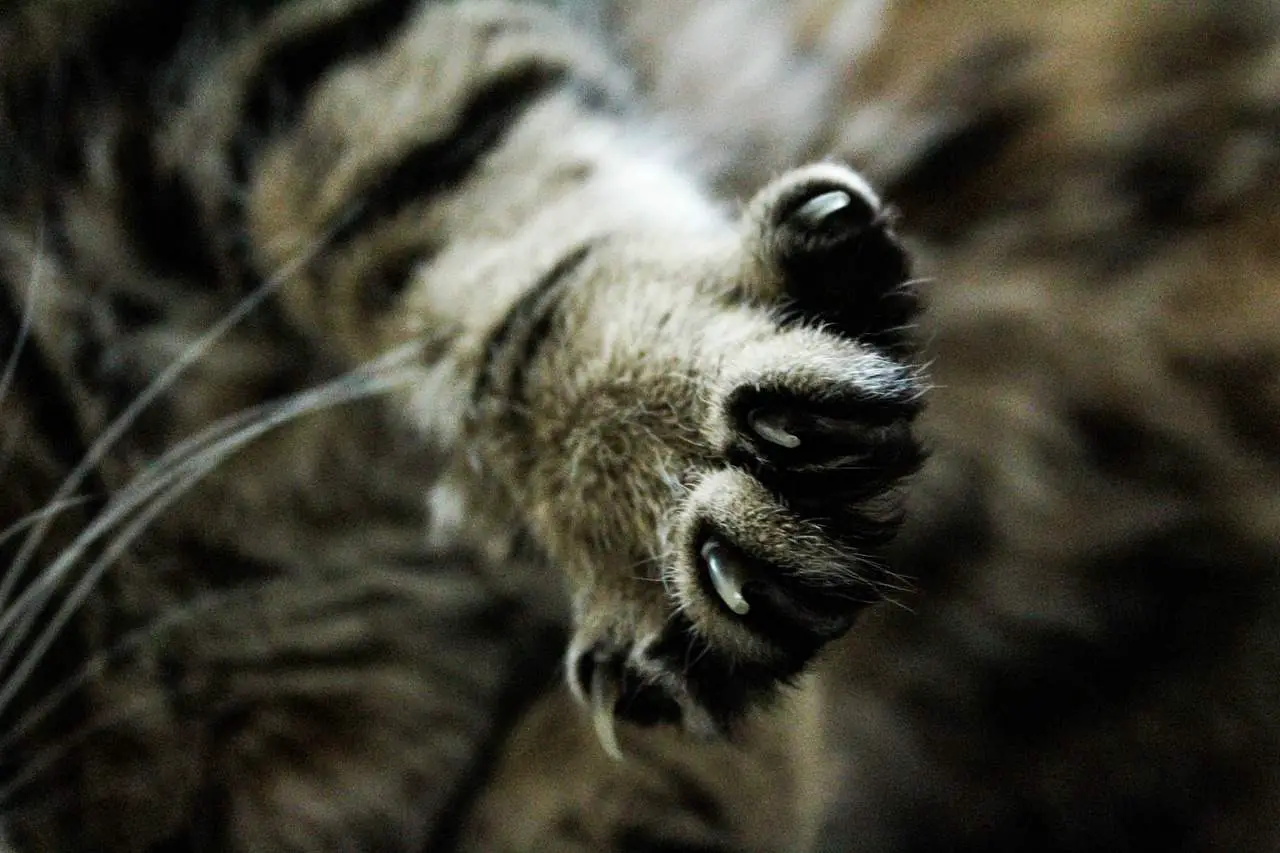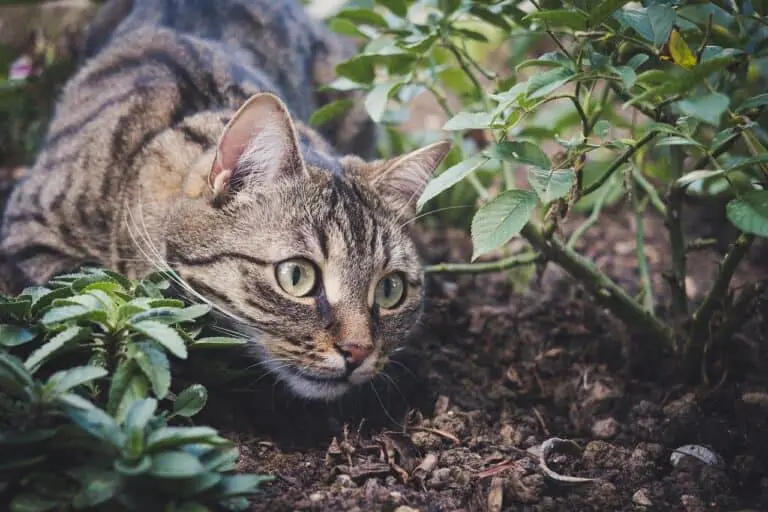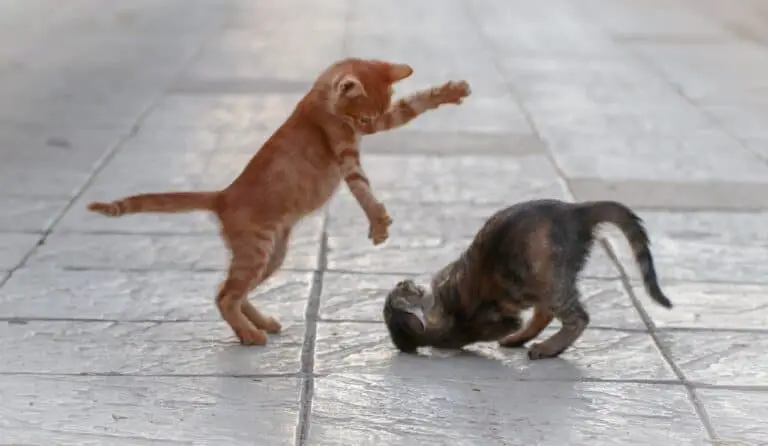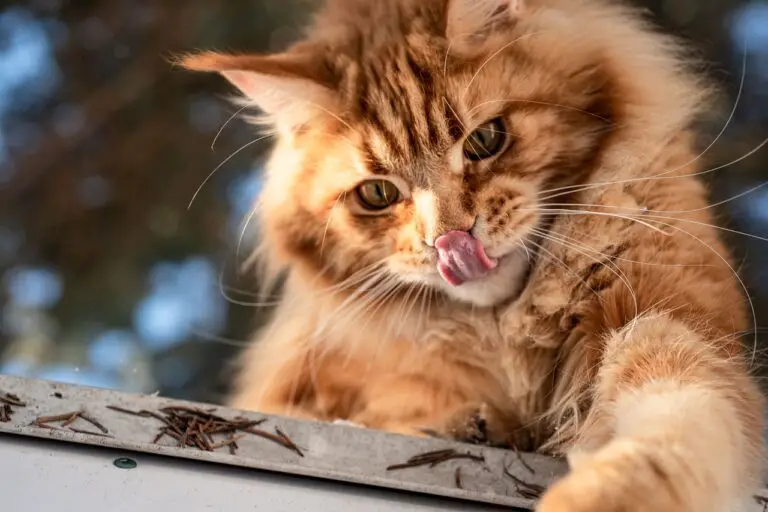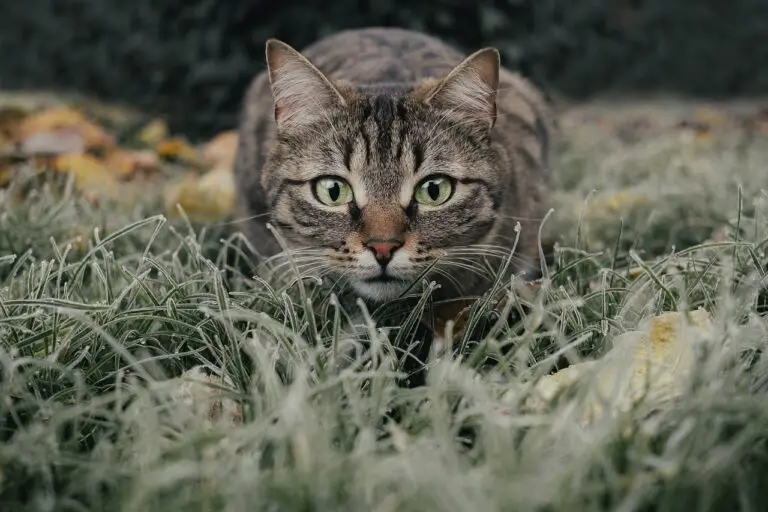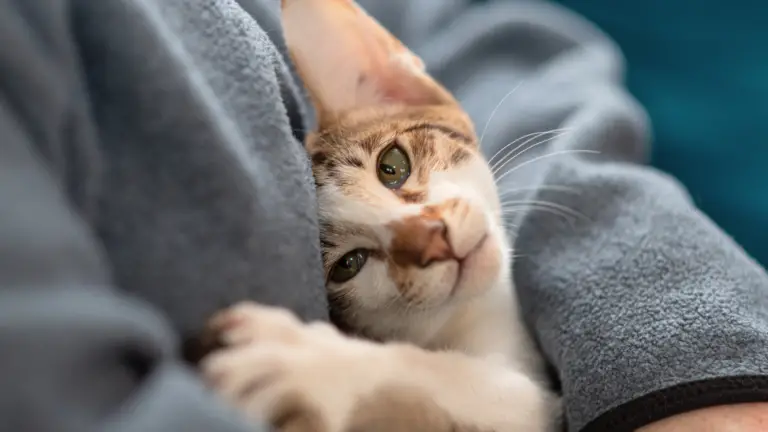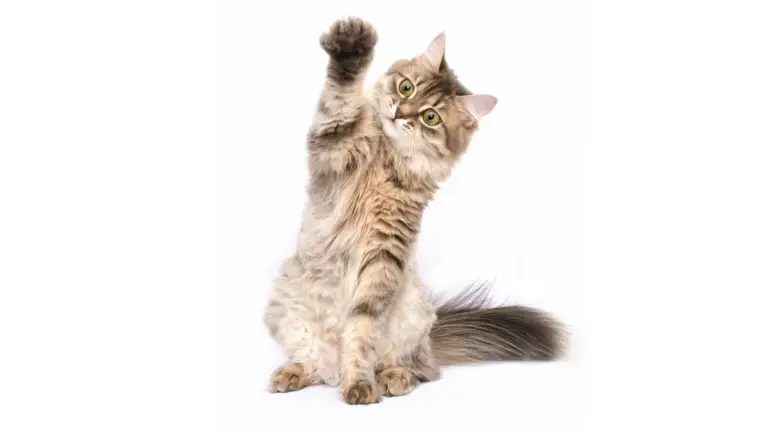WHY DO CATS BITE THEIR NAILS? 5+ REASONS AND REMEDIES
Why do cats bite their nails? At times cats chew and bite their nails as a regular grooming action. Cats can perfectly maintain their nails trimmed, cleaned, and in good condition; to do that, they also use their mouth.
Cats bite their nails like a routine in grooming, nails have an outer layer that sheds periodically, and cats are determined to remove it when it is time to leave their nails nice and sharp. However, if they become obsessed with it and do it too much, you may suspect a medical condition is present.
Let’s get into it.
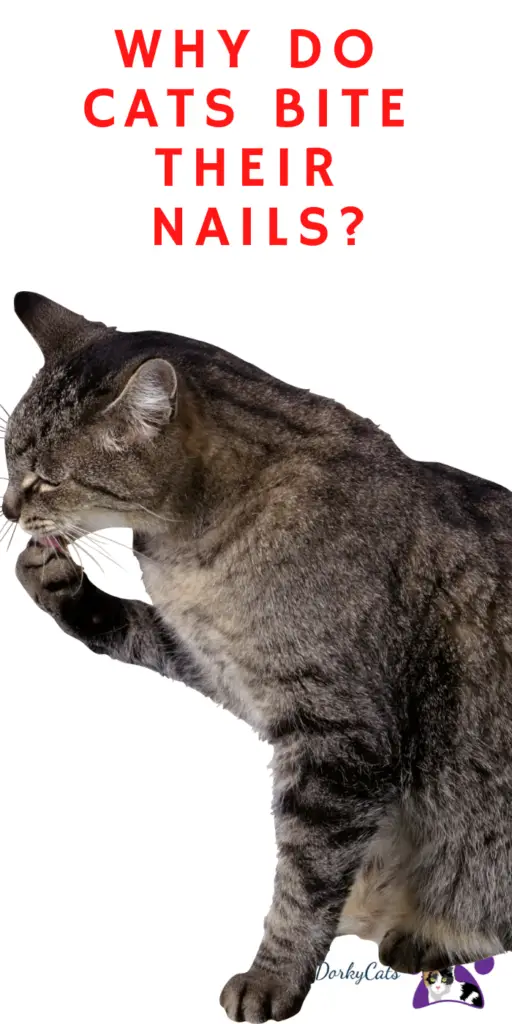
WHY DO CATS BITE THEIR NAILS?
It is usual for cats to bite their nails as part of their grooming routine.
Cats are known for their grooming habits, and biting their nails is a natural behavior that can help them remove dirt and debris from their paws and maintain the length and sharpness of their claws.
You may have seen your cat attacking, or better, attempting to groom its nails; often, he has to spread the paws and lick in between, and sometimes you see them biting to remove shedding nails.
Cats may bite their nails for a variety of reasons. Here are some possible explanations:
1. GROOMING
Cats use their nails to grab things, climb, and perform other essential tasks. For this reason, they have a daily grooming habit of removing dirt stuck between the paws and nails.
2. NAIL MAINTENANCE
Biting nails could also be a way for cats to maintain the length and sharpness of their claws. In addition, by biting their nails, they may be helping to keep them at a manageable size.
3. STRESS
Cats may sometimes bite their nails due to stress or anxiety. If your cat is experiencing a stressful situation, such as moving to a new home or introducing a new pet, it may turn to nail-biting to cope with its emotions.
4. MEDICAL SITUATIONS
Biting nails could indicate an underlying medical problem, such as an infection or injury. If you notice that your cat is biting their nails excessively or that their nails look abnormal, it’s important to consult with your veterinarian to rule out any medical problems.
Several medical situations can involve cats biting their nails excessively or abnormally. Here are some examples:
- Infections: Cats can develop nail bed infections or other infections that may cause them to bite their nails. Infections can cause pain or discomfort, and your cat may bite their nails as a way to try to alleviate the discomfort.
- Allergies: Cats can develop allergies to various substances, including food, environmental allergens, and flea bites. Allergies can cause itching and discomfort; your cat may bite their nails to relieve itchiness.
- Injuries: Cats can sustain injuries to their paws or nails, which can cause pain and discomfort. Your cat may bite their nails as a way to try to alleviate the pain.
- Behavioral issues: In some cases, excessive or abnormal nail-biting behavior in cats may indicate a behavioral issue, such as anxiety or compulsive disorder. These issues may require behavioral modification or medication to help your cat overcome them.
EXCESSIVE NAIL BITING IN CATS
Cats can obsessively bite their nails in certain situations, especially when stressed. Here are some of the reasons for excessive nail biting:
1. ANXIETY
Like humans do when anxious, cats also target their nails if they are stressed. Cats stress easily; anything can create anxiety, like a change in the schedule, a new person in the house, an unfriendly new pet, moving house, changing the location of his food, bed, and litter box, disturbing sounds, etc.
2. INFECTIONS
Cats can pick up bacterial or yeast infections in their paws, extending to their nails.
Here are some signs and symptoms of a bacterial infection in the paws:
- Redness
- Swelling
- Pain
- Itching
Your veterinarian can prescribe oral or topical antibiotics to treat an infected paw.
Some cats are prone to infections. Some infections can also result from contact with chemicals that have an irritating effect on the paws.
A few types of infections can create excessive nail biting in cats. Here are some examples:
- Bacterial infections: Bacterial infections can occur in the nail beds or surrounding tissues, causing pain, inflammation, and itching. Your cat may bite their nails excessively to alleviate these symptoms.
- Fungal infections: Fungal infections, such as ringworm, can affect the nails and surrounding tissues, causing itching and discomfort. Your cat may bite their nails as a way to try to alleviate these symptoms.
- Parasitic infections: Fleas and other parasites can cause itching and discomfort in cats, leading to excessive nail biting to relieve the symptoms.
Examples of parasites causing infections:
Pemphigus: Foliaceus (PF) means “leaf-like pemphigus.” This is the most common autoimmune skin disease of cats. With PM, the patient develops crusts (scabs) and ulcers around the eyes, ears, footpads, groin, and bridge of the nose. In cats, lesions also develop at the toenail beds creating crusty sore feet.
(Ref. vcahospitals.com)
Ringworm often causes a ring-shaped rash that is itchy, red, scaly, and slightly raised. The rings usually start small and then expand outward. Ringworm of the body (tinea corporis) is a rash caused by a fungal infection. It’s usually a red, itchy, circular rash with clearer skin in the middle.
(Ref. www.mayoclinic.org)
3. INJURY
Sometimes cats injure their paws or get an insect bite that swells their paws. Whatever the injuries, cats may lick and bite their paws and nails to remove the problem.
4. BRITTLE NAILS
Old cats may have brittle nails because they are getting old and may have some nutrition deficiency or health condition that results in weak nails. It can be the result of thyroid or kidney disease, to mention a few causes.
5. BOREDOM
Cats that are bored or understimulated may resort to nail-biting to occupy themselves. This is more common in indoor cats that do not have access to outdoor play or other forms of enrichment.
6. COMPULSIVE DISORDER
Some cats may develop compulsive disorders, such as obsessive-compulsive disorder (OCD), that can cause them to engage in repetitive behaviors like nail-biting.
Medical issues: As mentioned earlier, cats may bite their nails excessively due to medical problems such as infections, allergies, or injuries.
HOW CAN I REDUCE OBSESSIVE NAIL BITING IN CATS?
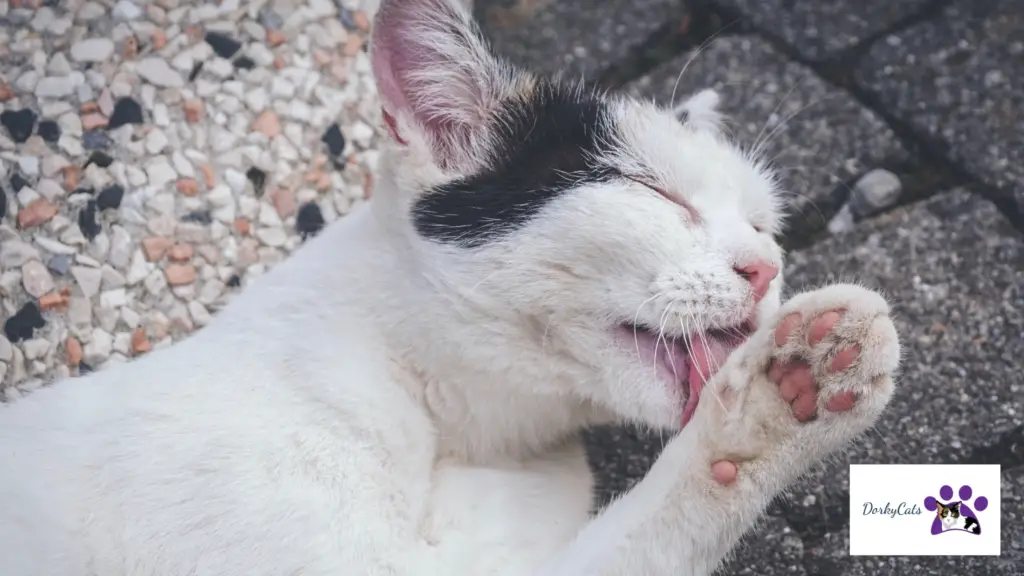
Reducing obsessive nail biting in cats requires identifying and addressing the underlying cause of the behavior.
Here are some strategies that may help:
REGULAR TRIMMING
Keeping your cat’s nails trimmed can help reduce the urge to bite them excessively. Work with your veterinarian or a professional groomer to learn how to safely and effectively trim your cat’s nails.
PROVIDE ENRICHMENT
Ensuring your cat has plenty of play opportunities and mental stimulation can help reduce boredom and under-stimulation, possibly contributing to nail biting. Offer toys, scratching posts, and other forms of enrichment to keep your cat engaged and entertained.
Here are some examples of scratching posts:








ADDRESS ANXIETY OR STRESS
Addressing these underlying issues is important if your cat’s nail biting is related to anxiety or stress. For example, provide your cat with a quiet, safe space to retreat when they feel anxious, and consider using pheromone sprays or diffusers to help create a calming environment.
CONSULT THE VET
If your cat’s nail biting is severe or does not respond to at-home interventions, consult your veterinarian. They can perform a thorough physical examination, run diagnostic tests, and recommend appropriate medications or behavioral therapies to help your cat overcome the behavior.
DO CATS TRIM THEIR NAILS?
Cats can naturally wear down their nails through scratching and other activities. However, this may not always be sufficient to keep their nails at an appropriate length. In some cases, cats may need to trim their nails to prevent them from becoming too long and causing discomfort or other issues.
Cats naturally take care of their bodies. Even without humans, they can perfectly groom themselves and their nails.
Although typically, cats use scratch surfaces to trim and sharpen their claws, this habit may not be very popular with cat owners since couches and furniture are not safe anymore, but it is a regular cat habit.
In the wild, cats may wear down their nails through climbing and digging, but domestic cats typically do not have the same opportunities for natural wear and tear on their nails.
As a result, it is often necessary for cat owners to provide regular nail trims to ensure their cat’s nails are at a healthy length.
FREQUENTLY ASKED QUESTIONS
Why do cats bite their paws when cleaning?
When grooming, cats may bite at their paws to remove any debris or dirt stuck in their fur. Cats also use their mouths to remove loose hair during grooming. In addition, biting at their paws can help them reach harder-to-reach areas.
In some cases, cats may bite their paws excessively due to itching or discomfort. Allergies, skin irritation, or other underlying health conditions may cause this.
Some cats may bite their paws as a form of self-soothing when they are stressed or anxious. However, this behavior may also be accompanied by other signs of stress or anxiety, such as pacing, hiding, or vocalizing.
Why do cats try to pull their claws out?
As mentioned above, claws have an outside layer that becomes old and eventually comes off. When this layer is about to come off, cats bite on it to remove it even earlier so that the underneath claws are coming out way sharper.
Do indoor cats need their nails trimmed?
Yes, indoor cats often need their nails trimmed. Even though indoor cats may not have the same opportunities to wear down their nails through climbing or digging as outdoor cats, their nails can still become too long and cause discomfort or other issues.
Overgrown nails can cause problems such as snagging on furniture or carpets or even growing into the paw pad, which can be painful and lead to infection. Regular nail trims can help prevent these issues and keep your cat’s nails at an appropriate length.
The frequency of nail trims will depend on the individual cat’s nail growth rate and activity level. Some cats may need their nails trimmed every few weeks, while others may need less frequent trims.
Read also: WHY ARE DOGS AFRAID OF CATS? EPIC CATS TRICKS
